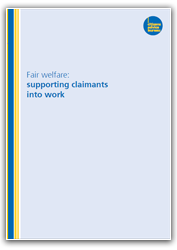Fair welfare: supporting claiments back to work

Introduction
Problems relating to social security benefits and specifically out-of-work benefits is a significant area of concern for CAB clients. Over half of all working age CAB clients are not in paid work.
In 2009/10 Citizens Advice Bureaux across England, Wales and Scotland provided advice on over 7 million issues (7.1 million in England and Wales in 2009/10, and 456,552 in Scotland in 2009/10) of which more than half a million were about out-ofwork benefits.7 The CAB service is therefore well placed to seek the views of the back-to-work support experienced by benefit claimants.
In order to get a more detailed picture of our clients’ experiences of ‘backto-work’ support, Citizens Advice and Citizens Advice Scotland conducted a survey based research project. Between September 2009 and March 2010, CAB clients and members of the public told us their experiences by completing a survey available in hard copy at Citizens Advice Bureaux throughout England, Wales and Scotland, and on the Citizens Advice and Citizens Advice Scotland websites. All respondents, including jobseeker’s allowance claimants, were asked about the training and support offered by Jobcentre Plus and about what they felt would help them return to work.
Lone parents and claimants of sickness and incapacity benefits were also asked about their experiences of work focused interviews. Respondents were also asked to complete campaign postcards, on which they could tell their story in more detail.
- A total of 845 people responded to the survey – 178 of these were via paper surveys distributed at local CAB offices and 667 were online.
- There was a roughly even split between men (48 per cent) and women (52 per cent).
- 56 per cent were claiming jobseeker’s allowance – of whom 57 per cent had been claiming for less than six months.
- 31 per cent were claiming sickness and incapacity benefits.
- 10 per cent were claiming income support as lone parents.
- 250 people sent postcards telling us their story of claiming benefits.
This report aims to provide a voice to these respondents. It does not claim to be representative of all benefit claimants, but where common themes emerge, these experiences serve to highlight areas of the current system that would benefit from further analysis. We hope that the concerns of claimants expressed in the report will be addressed in the design of the Government’s new single work programme.

